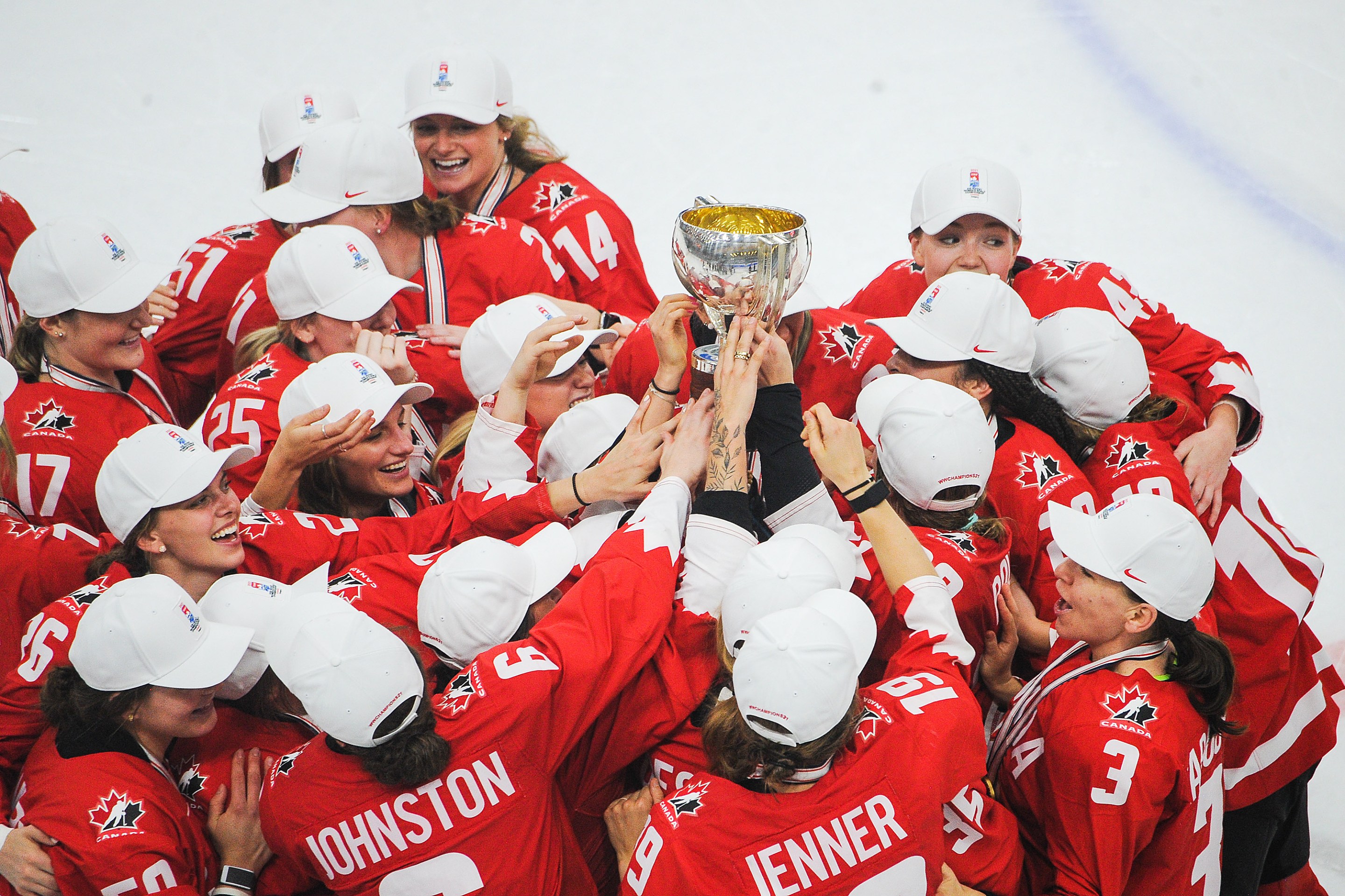Everyone knew. Consciously, subconsciously. Everyone knew Marie-Philip Poulin’s overtime bar down snipe—an absolute beauty of a goal—had won Canada its first women’s world hockey championship gold medal since 2012. Poulin knew; she began celebrating. American goaltender Nicole Hensley knew; she looked ready to head off the ice. The spectators behind the net knew. The broadcast crew knew. If you’ve followed Poulin’s career, you might have even known Canada had won the second Brianne Jenner fed a streaking Poulin the puck—an absolute beauty of a pass—and there was no American skater in front of her.
Everyone knew, except the officials. It was a pretty bizarre scene: For about 40 seconds after the golden goal, play continued. Nothing had been called on the ice. TSN's bemused Rod Black was left to insist awkwardly, "This game is over" while Canada just bobbed around in their own zone for a bit, the game technically not over. Finally, someone watched a replay and a buzzer sounded to declare the goal good, play dead, and the game finished at 3-2. What a way to win!
If the tournament ended in almost comic anticlimax, with the dull sound of a video review buzzer, no one on Team Canada really seemed to care. They found relief in the victory after five straight disappointments at this tournament, including missing the gold medal game entirely in 2019. Poulin had missed several games at this year's tournament in Calgary with an upper-body injury, so that the win came off the stick of their captain and the game's greatest made the moment even sweeter. The game itself, another chapter in of one of the best rivalries in sports, was thrilling; my plan to watch dispassionately went out the window the second U.S. forward Alex Carpenter converted on her own rebound to open up scoring in the first period. When Carpenter ground out a similar second goal on the power play 10 minutes later, I was hovering. But Canada dominated the second period, figured out its signature forecheck, scored two goals in a span of three minutes—first Jenner net front on the power play, then a perfect Jamie Lee Rattray deflection—and tied it up. (Only tied it up, thanks to some standout saves by Hensley.) By overtime, I was catatonic.
Jamie Lee Rattray ties the game 2-2 👀 #WomensWorlds pic.twitter.com/uUmLqVz1cB
— Shayna (@hayyyshayyy) September 1, 2021
I resent that conversations about women's sports so easily tip into the existential. It offers people who don't watch games a little too much opportunity to weigh in anyway. But to divorce the play at this tournament from the state of competitive women's hockey amid the pandemic would be kind of myopic. National team players were devastated in April when the IIHF announced—just a day before teams were set to arrive for women's worlds in Nova Scotia—that it would be canceling the tournament for the second year in a row due to coronavirus case concerns in the host province, a last-minute blow the U.S.'s Hilary Knight called "another reminder that women's hockey continues to be an oversight." The IIHF's men's events this year, including its U18 tournament, all went on. A few weeks later, the IIHF committed to rescheduling in a new location, but when the tournament did finally start two weeks ago, it had been 860 days since the last international best-on-best women's hockey event.
Building a competitive roster with so few data points is hard. National team members had some opportunities to play competitive games in PWHPA showcase events—they continue to boycott the NWHL—but those events have been infrequent since the pandemic began. It was telling that power plays, the element of hockey that most requires chemistry on top of sheer talent, were unimpressive for both teams for most of the tournament. Until the quarterfinal round, Canada's penalty kill had actually outscored its power play. "I think power plays are overrated in a short-term tournament," U.S. head coach Joel Johnson said after his team's loss to Canada in Friday's preliminary round game, a surprising 5–1 loss. He changed his tune Tuesday night, after the U.S. couldn't score on any of three opportunities in the third period. "We've got to score on the power play, we've got to generate more chances and be more organized and I take 100 percent responsibility as a coach for us not being as prepared or successful in that area," he said. Interesting!
The U.S. has some more information now, but like the joke about small portions and terrible food, it's an unfortunate combination of fallible and not reassuring. The defense (from what we could tell in this 10-day glimpse) is a bit erratic, prone to momentum-killing turnovers; the veteran forwards were (from what we could tell) slow and out of sync, enough so that defender Lee Stecklein actually led the team in scoring; and the most interesting (from what we could tell) young players got very little time to prove themselves. The reigning Olympic champions have (from what we could tell) some work ahead of them as they prepare for Beijing.






